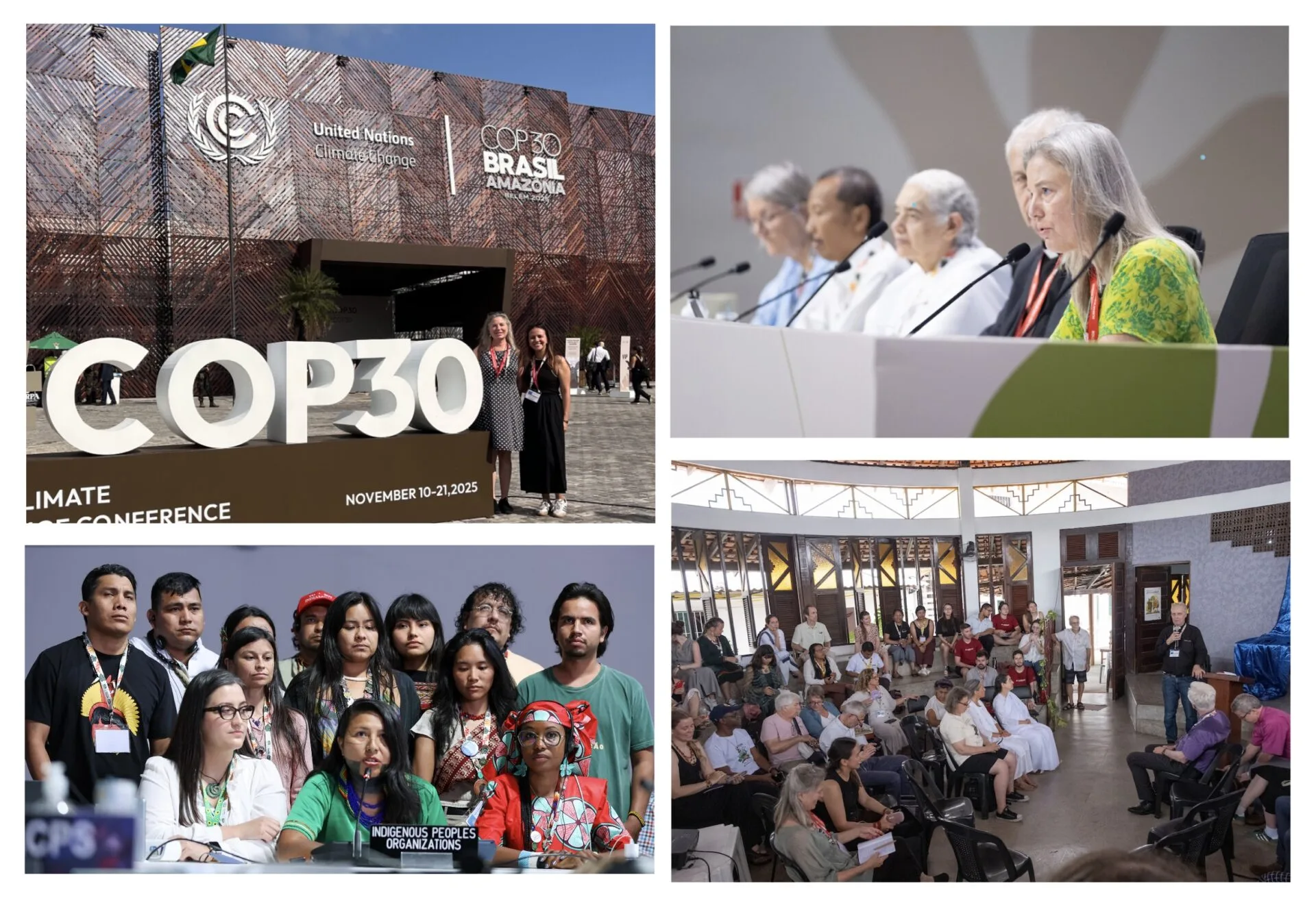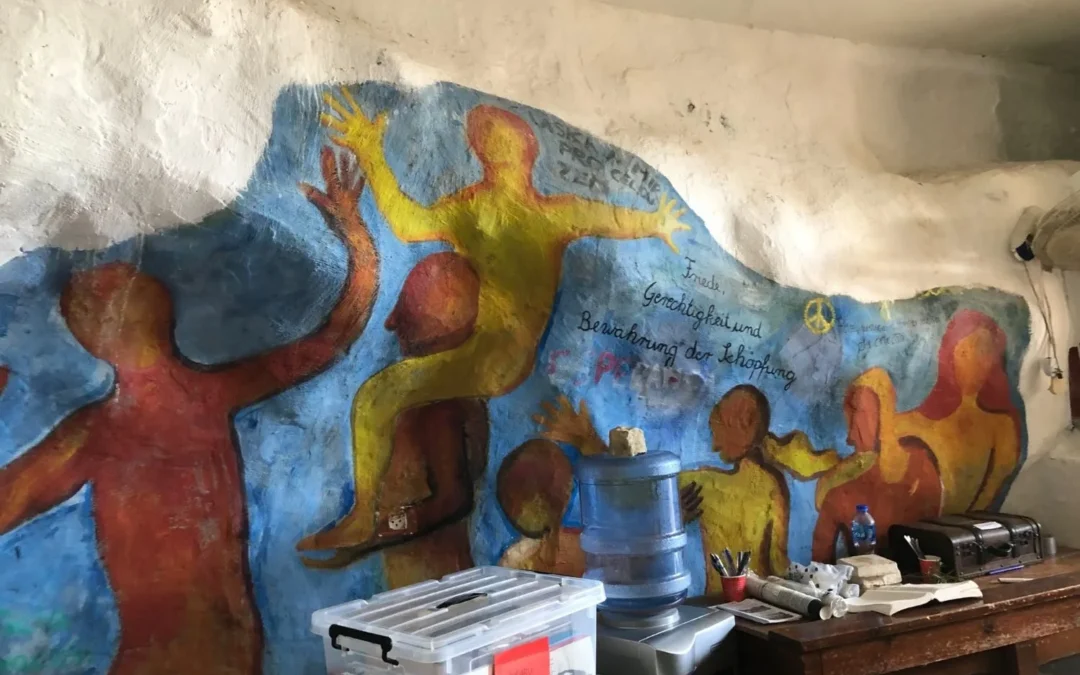QUNO’s Human Impacts of Climate Change (HICC) staff, Lindsey Fielder Cook and Daniela Campos, were present at the Conference of Parties (COP30) from 9–23 November in Belém, Brazil. This first report focuses on QUNO’s activities and will be followed by a second report offering an analysis of both concerns and positive outcomes.
While knowing that more than 56,000 people from all over the world came together to share and negotiate global climate action, some might still wonder what happens inside COPs. To offer a clearer glimpse of this experience, we are sharing a narrated report of the major events, negotiations, and interactions where QUNO brought a Quaker voice—advocating peaceful, just, and equitable transformations of activities driving existential levels of climate change and related planetary crises.
Amplifying our Voice and Values at COP30 – Interfaith events : With our Interfaith Liaison Committee colleagues, we helped host an interfaith Talanoa Dialogue at the Lutheran Church Igreja Evangelica de Confissão Luterana, bringing together over 120 people in person from all over the world, with translation between English and Portuguese, and more than 30 participants online.
During the COP, we supported faith-based colleagues in their efforts, including newcomers navigating the space, and engaged with Holy See representatives on using their observer access to better represent the moral call for climate action. Finally, Lindsey spoke on the interconnections between peace and climate change at a COP press conference organized by the ILC group. The press conference can be viewed here.
We organized and implemented an official COP side event titled “Ethics and Faith Transforming Community, National, and Global Climate Action”, which can be seen here. During this event, Lindsey spoke on ethics, science, and concerns regarding false solutions. This side event was co-hosted with Quakers in Britain, Quaker Earthcare Witness, Brahma Kumaris, and Soka Gakkai Buddhists.
Finally, Lindsey was interviewed by the Climate Wisdom Team, which can be viewed here.
Negotiation Progress and Quiet Diplomacy with a Diverse Group of Negotiators : As QUNO attended the Intergovernmental Panel on Climate Change (IPCC) meetings in Lima, Peru before the COP, we continued to follow COP negotiation meetings in which some Parties sought to weaken or discredit the IPCC and climate science findings in general. This is of significant concern to QUNO, and we twice met privately with IPCC colleagues as well as negotiators to better understand their expressed concerns.
We also spoke with a range of negotiators to hear their hopes and concerns—work that is integral to our June quiet-diplomacy dinners for negotiators, which aim to help build communication among a diverse group of countries. QUNO identifies outcomes of the negotiations, but equally important is listening to countries’ positions and underlying motivations, and understanding how individual national priorities intertwine with the geopolitical dynamics of multilateralism. Genuine listening and engagement are essential to prevent unintended levels of damage in the Plenary.
Creating Alliances with Faith Groups, Scientists, and Human Rights Advocates : QUNO is part of the Research and Independent Non-Governmental Organizations (RINGO), joining daily discussions and analysis of the negotiations. QUNO is also part of pre-COP coordination and the daily COP meetings of the Human Rights and Climate Change Working Group. We advocate for climate policies grounded in human-rights-based approaches, including the rights of Indigenous Peoples, peacebuilding, and the protection of biodiversity.
Sharing technical knowledge : During these two weeks, QUNO disseminate 300 copies in both English and Spanish of our publications, A Government Official’s Toolkit and What We Can Do, alongside QR codes to access additional translations in Arabic and French. These publications reference key IPCC climate science findings on urgent, healthy, equitable and available-at-scale climate action, as manageable toolkits for negotiators, policymakers and people. QUNO has created the only available IPCC translations and we hand delivered them directly to country delegates.
Strengthening Quaker Connections : We participated in a pre-COP meeting for Quaker Earthcare Witness (QEW) Climate Ambassadors programme. Through the support of QEW, we meet with students from U.S. Quaker schools—Germantown Friends and Westtown at the COP’s exhibition site for the public, known as the Green Zone. Lindsey also took the opportunity to engage UK Secretary of State Ed Miliband on the story of an embroidered gift made for him from Friend Teresa Belton, with hand stitched words thanking him for his commitment on no new oil and gas. It was an important personal moment in this COP. Mr. Miliband took time to record a thank you message for this gift.
QUNO stayed at the COP through the additional 24-hour extension, speaking with negotiators, UN representatives, and civil society colleagues about the agreed texts, and monitoring the political dynamics that will influence our work in 2026 and beyond.







